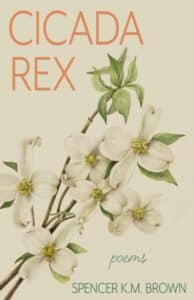Spencer Brown uses the cicada as a metaphor for life
I discovered a poet because I read his novel first.
Someone had recommended Hold Fast, the second novel by Spencer K.M. Brown. It’s a moving story of a father and his adult son, how they deal with grief, and how they adapt to the loss of people and their own individual dreams. It’s a beautiful story, set on the stark, cold shore of Lake Superior.
I learned that Brown had published a previous novel, Move Over Mountain (2022), and a poetry chapbook (2024), Cicada Rex. Given that this was year of the cicada, at least around my neighborhood, I had to read the poetry collection.
If you live in the Mississippi River Valley, especially in Missouri or Illinois, you know about cicadas. This spring, two varieties began to emerge simultaneously, numbering in the billions. Our neighborhood and the surrounding area had young trees wrapped in thin, white gauze-like material; established trees could manage the onslaught but young trees and new ones were vulnerable. Cicadas lay their eggs by digging trenches at the ends of tree limbs, which is convenient for reproduction but will kill the ends of those limbs. I wrapped our new, young hydrangea tree in the white material, which will allow sunlight and rain through, and it did fine. But our established trees had lots of dead limb ends.
For days, the noise was deafening, lessening only at nightfall. And we weren’t even ground zero; that was 70 miles south of us near Farmington, in the middle of Missouri’s old Lead Belt.
When I saw the reference to Brown’s Cicada Rex: Poems, I knew I’d be reading it. (It’s available only from the publisher, Ghost City Press.) It’s not all about cicadas, although I suspect Brown lives on Cicada Avenue, which he mentions a few times in various poems. Ostensibly, the collection is about caves, trees, fires, dinosaurs, the weather, and even sardines, among other subjects. In Brown’s hands, the subjects become metaphors for life.
And so do cicadas.
Cicada

like rosary beads, shed of string and sinner’s fingers.
Whiskey tonight; tomorrow, wine.
Li Po said: To wash our souls of age-old sorrows, use wine.
Tonight is for wallowing.
Tomorrow I’ll clean again.
Above the nightsounds and nightwind,
cicadas yawn off a 17-year sleep.
to rest half as long, to let my language become landscape,
And be free of strings and age-old sorrows.
Would that it were so.
Would that I, for once, could.
The poems suggests a longing for shaking free from the past, with all of its sorrows and baggage. And yet, using the metaphor of the cicada, the poet realizes it’s simply not possible. We were the sum of what’s come before, and like the cicada, our lives can become repetitious—and short.

Spencer K.M. Brown
All of the poems in the collection have these same layers of meanings. They leave you thoughtful, pondering things you’ve forgotten and wondering if you can break through your self-imposed barriers. Perhaps you have to understand and accept how much of your life may be like the cicada’s.
Brown previously published the novels Move Over Mountain and Hold Fast. His stories and poems have received numerous prizes and recognitions, including the Penelope Niven Award, the Flying South Fiction prize, the Doris Betts Fiction Prize, and the Thomas Wolfe Fiction Prize. He lives in North Carolina with his family, possibly on Cicada Avenue.
Brown has a marvelous gift for language. Hold Fast is a work of fiction but has the same lyrical quality as his poetry. You read his work, and you’re struck with the insights this young poet and writer displays about life.
Photo by akigabo, Creative Commons, via Flickr. Post by Glynn Young.
How to Read a Poem uses images like the mouse, the hive, the switch (from the Billy Collins poem)—to guide readers into new ways of understanding poems. Anthology included.
“I require all our incoming poetry students—in the MFA I direct—to buy and read this book.”
—Jeanetta Calhoun Mish


Leave a Reply